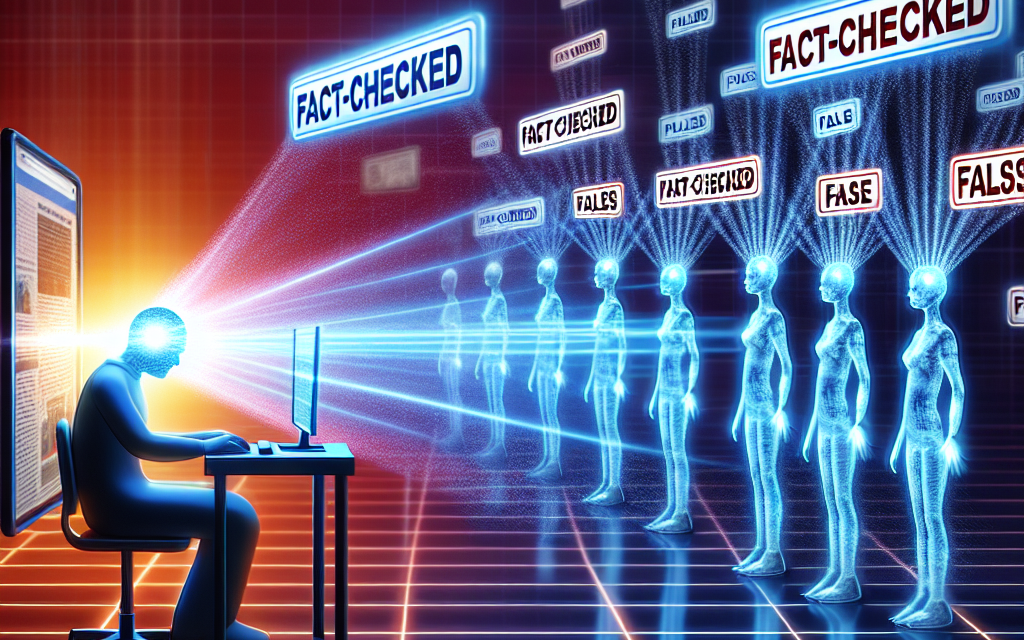The Effects of Meta’s Fact-Checking Changes on Mental Health
In an era where misinformation spreads rapidly across social media platforms, the role of fact-checking has become increasingly crucial. Meta, the parent company of Facebook and Instagram, has made significant changes to its fact-checking policies in recent years. These changes have not only impacted the dissemination of information but have also had profound effects on users’ mental health. This article delves into the multifaceted relationship between Meta’s fact-checking changes and mental health, exploring various dimensions of this complex issue.
1. Understanding Meta’s Fact-Checking Changes
Meta has implemented a series of changes to its fact-checking processes, aimed at combating misinformation and enhancing the credibility of information shared on its platforms. These changes include partnerships with independent fact-checking organizations, the introduction of warning labels on disputed content, and the reduction of the reach of posts flagged as false or misleading.
One of the most significant shifts has been the expansion of Meta’s fact-checking network. The company has partnered with numerous fact-checking organizations worldwide, allowing for a more diverse and comprehensive approach to identifying misinformation. This global perspective is essential, as misinformation can vary significantly across different cultures and regions.
Moreover, Meta has introduced algorithms that prioritize content from verified sources while demoting posts flagged as false. This algorithmic change aims to reduce the visibility of misleading information, but it also raises questions about censorship and the potential for bias in the information users receive.
These changes have sparked debates about freedom of speech, the role of social media in shaping public discourse, and the responsibility of tech companies in curbing misinformation. However, the implications of these changes extend beyond the realm of information accuracy; they also significantly impact users’ mental health.
2. The Psychological Impact of Misinformation
Misinformation can have severe psychological effects on individuals and communities. The spread of false information can lead to increased anxiety, confusion, and distrust among users. Research has shown that exposure to misinformation can create a sense of helplessness, particularly during crises such as the COVID-19 pandemic.
For instance, a study conducted by the Pew Research Center found that 64% of Americans believe that misinformation has caused confusion about basic facts related to the pandemic. This confusion can lead to heightened anxiety levels, as individuals struggle to discern what is true and what is false.
Furthermore, misinformation can exacerbate feelings of isolation and loneliness. When individuals encounter conflicting information, they may withdraw from social interactions, fearing judgment or ridicule for their beliefs. This withdrawal can lead to a cycle of negative mental health outcomes, including depression and anxiety.
Additionally, misinformation can contribute to a phenomenon known as “information overload.” In an age where users are bombarded with information from various sources, the inability to filter out falsehoods can lead to cognitive fatigue. This fatigue can manifest as stress, irritability, and difficulty concentrating, further impacting mental well-being.
3. The Role of Social Media in Mental Health
Social media platforms like Facebook and Instagram play a significant role in shaping users’ mental health. While these platforms can foster connections and provide support, they can also contribute to negative mental health outcomes. The changes in Meta’s fact-checking policies have added another layer to this complex relationship.
On one hand, the implementation of fact-checking measures can help create a safer online environment by reducing the spread of harmful misinformation. This can lead to improved mental health outcomes for users who feel more secure in the information they consume. For example, during the pandemic, users who relied on verified information reported feeling less anxious and more informed about health guidelines.
On the other hand, the fact-checking changes can also lead to increased frustration and anger among users. When posts are flagged or removed, users may feel that their freedom of expression is being curtailed. This perception can lead to feelings of resentment towards the platform and contribute to a negative user experience.
Moreover, the emotional toll of encountering misinformation can be exacerbated by the social dynamics of online platforms. Users may feel compelled to engage in debates or confrontations over disputed information, leading to heightened stress and anxiety. The pressure to defend one’s beliefs in a public forum can be overwhelming, particularly for individuals who are already struggling with mental health issues.
4. Case Studies: Real-World Implications
To better understand the effects of Meta’s fact-checking changes on mental health, it is essential to examine real-world case studies that illustrate these dynamics. One notable example is the impact of misinformation during the COVID-19 pandemic.
During the pandemic, social media platforms became a primary source of information for many individuals. However, the rapid spread of misinformation regarding the virus, treatments, and vaccines led to widespread confusion and fear. In response, Meta implemented stricter fact-checking measures to combat this misinformation.
Research conducted by the University of California, San Diego, found that individuals exposed to misinformation about COVID-19 were more likely to experience anxiety and stress. The study revealed that users who encountered false claims about the virus were more likely to report feeling overwhelmed and uncertain about their health and safety.
Another case study involves the 2020 U.S. presidential election, where misinformation regarding voting procedures and candidate qualifications proliferated on social media. Meta’s fact-checking changes aimed to address this issue, but they also led to increased polarization among users. Many individuals felt that their political beliefs were being attacked when their posts were flagged or removed, leading to heightened emotional distress.
These case studies highlight the complex interplay between misinformation, fact-checking, and mental health. While fact-checking measures can mitigate the spread of false information, they can also contribute to feelings of frustration and anxiety among users.
5. Strategies for Mitigating Mental Health Effects
Given the potential mental health implications of Meta’s fact-checking changes, it is crucial for users to adopt strategies that promote well-being in the digital age. Here are several approaches that can help mitigate the negative effects of misinformation and fact-checking on mental health:
- Limit Social Media Use: Reducing the time spent on social media can help alleviate feelings of anxiety and stress. Users should consider setting boundaries around their social media consumption, such as designated “screen-free” times.
- Seek Reliable Sources: Users should prioritize information from reputable sources and fact-checked content. Engaging with verified information can help reduce confusion and anxiety related to misinformation.
- Practice Mindfulness: Mindfulness techniques, such as meditation and deep breathing exercises, can help users manage stress and anxiety. Taking breaks from social media to engage in mindfulness practices can promote mental well-being.
- Engage in Positive Online Communities: Connecting with supportive online communities can provide a sense of belonging and reduce feelings of isolation. Users should seek out groups that promote constructive discussions and share verified information.
- Educate Others: Users can play an active role in combating misinformation by educating friends and family about reliable sources and fact-checking practices. This proactive approach can foster a sense of agency and empowerment.
Conclusion
The changes in Meta’s fact-checking policies have far-reaching implications for users’ mental health. While these measures aim to combat misinformation and promote accurate information, they also contribute to feelings of anxiety, frustration, and isolation among users. Understanding the psychological impact of misinformation and the role of social media in mental health is essential for navigating the digital landscape.
As users, it is crucial to adopt strategies that promote well-being and resilience in the face of misinformation. By prioritizing reliable sources, engaging in positive online communities, and practicing mindfulness, individuals can mitigate the negative effects of social media on their mental health.
Ultimately, the relationship between Meta’s fact-checking changes and mental health is complex and multifaceted. As social media continues to evolve, ongoing research and dialogue will be essential in understanding and addressing these challenges. By fostering a culture of critical thinking and responsible information sharing, we can work towards a healthier digital environment for all.





